'Everything about it was exceptional': Winnipeg-born costume designer shares experience working on Oscar-nominated film
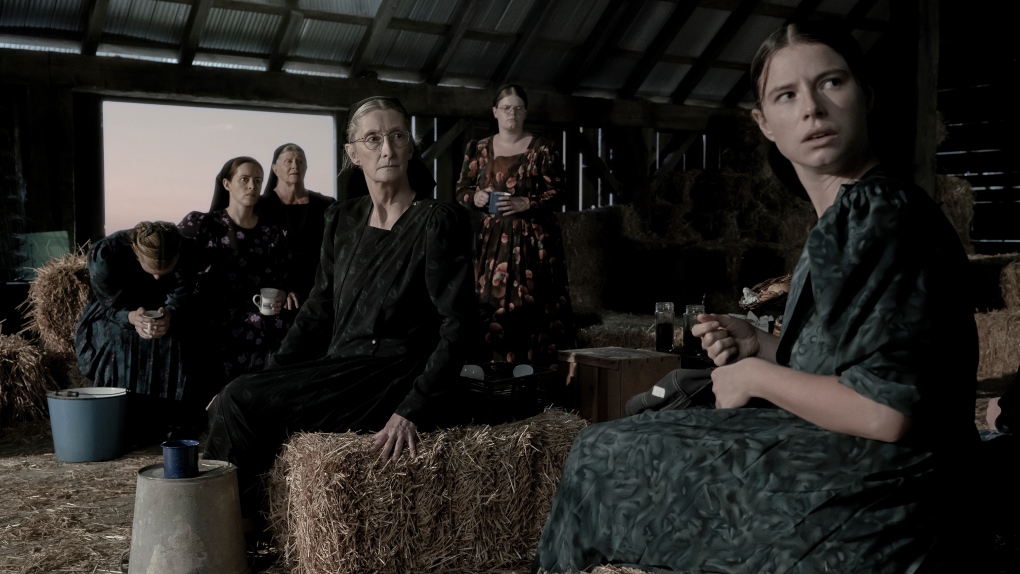 This image released by United Artists shows Judith Ivey, left, and Claire Foy in a scene from "Women Talking." (Michael Gibson/Orion - United Artists Releasing via AP)
This image released by United Artists shows Judith Ivey, left, and Claire Foy in a scene from "Women Talking." (Michael Gibson/Orion - United Artists Releasing via AP)
A Winnipeg-born costume designer woke up to a flurry of text messages Tuesday morning, as the nominations for the 95th annual Academy Awards were read miles away in a crowded Hollywood theatre.
“I was at my home here in Winnipeg, just lazily starting to wake up when my phone started to go crazy,” Quita Alfred recalled in a phone interview with CTV Winnipeg.
The reason for the barrage of well wishes so early in the morning? “Women Talking,” a film Alfred designed the costumes for, nabbed two nominations, including Best Picture.
Alfred isn’t the only Manitoba connection to "Women Talking." The film is based on the novel of the same name by Steinbach’s own Miriam Toews. To add more Canuck prestige, it was adapted and directed by Canadian filmmaker and actor Sarah Polley, who received a nomination for Best Adapted Screenplay.
Alfred first got a call about the gig back in January of 2021. Producer Lyn Lucibello was developing the project alongside Polley. Having worked with Alfred a few times before, Lucibello floated her name for the job.
“When I heard Sarah's name, I was very intrigued, and then I heard that it was a Miriam Toews novel, and my head exploded because I thought all of those wonderful people in one event would be really, really fantastic,” she said.
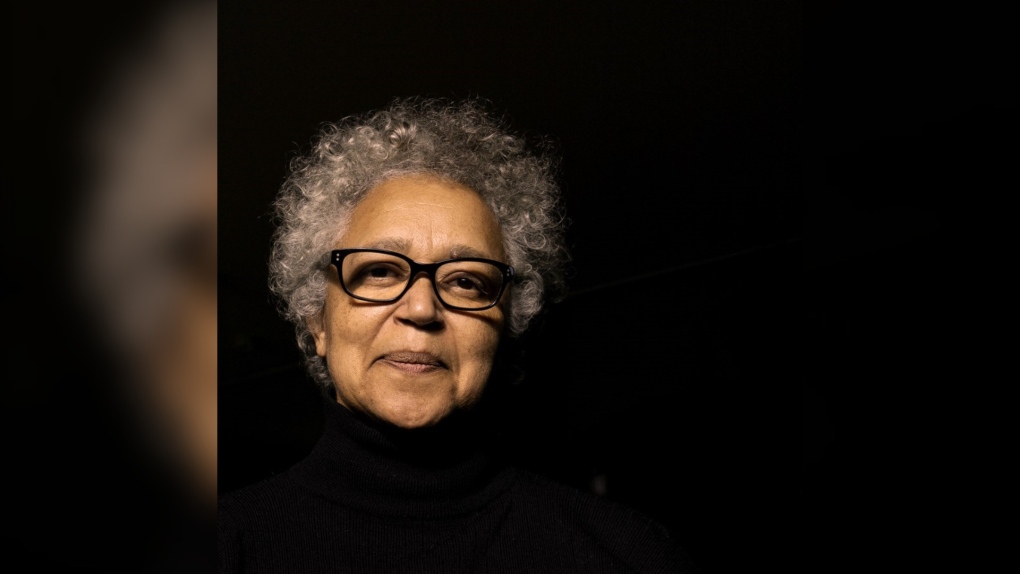 Quita Alfred was born and raised in Winnipeg, Man. Her love of costume and design started at a young age when her mother taught her to sew. She went on to study theatre production at what was then called Ryerson Polytechnical Institute, which began a 35-year career working in television and film. (Source: Balthazar Alfred)
Quita Alfred was born and raised in Winnipeg, Man. Her love of costume and design started at a young age when her mother taught her to sew. She went on to study theatre production at what was then called Ryerson Polytechnical Institute, which began a 35-year career working in television and film. (Source: Balthazar Alfred)
Coincidentally, this wasn’t Alfred’s first time working with Polley. Alfred was an assistant costume designer 30 years ago on a Canadian period drama that has since become a seminal classic – “The Road to Avonlea”.
Polley was only 10 years old when Alfred costumed her to play Sara Stanley, a young, wealthy girl sent to live with relatives on Prince Edward Island.
Still, Alfred said the woman who sat before her on a Zoom call decades later to discuss “Women Talking” felt largely the same.
“She was the same brilliant, smart, wonderful, bright light that she is now. I have always been fascinated by Sarah’s mind. Even as a child, she was smart and articulate and forward-thinking,” Alfred said.
Polley was shocked to learn that Alfred was from Manitoba - one in a series of serendipitous moments on the project.
Needless to say, Alfred landed the job.
DELVING INTO THE MENNONITE WORLD OF “WOMEN TALKING”
Thanks to her Manitoba roots, Alfred had some familiarity with Mennonite culture, and quickly immersed herself in researching the film.
“Women Talking” tells the story of women living on the remote Mennonite colony of Molotschna who gather in a hay loft for a secret meeting. For years, they reported violent assaults, but were told by the men of their colony they were being punished for their sins by demons. When they learn the attacks were perpetrated by a group of men from their own community, the women band together to find a way to protect themselves and their daughters.
The novel released in 2018 went on to become a national bestseller and a finalist for the Governor General’s Literary Award.
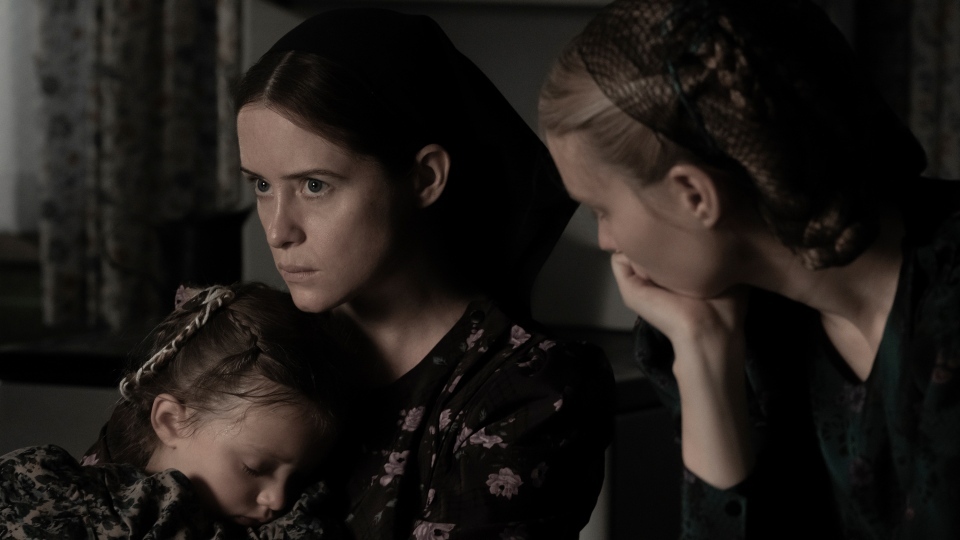 This image released by United Artists shows Emily Mitchell, from left, Claire Foy and Rooney Mara in a scene from "Women Talking." (Michael Gibson/Orion - United Artists Releasing via AP)
This image released by United Artists shows Emily Mitchell, from left, Claire Foy and Rooney Mara in a scene from "Women Talking." (Michael Gibson/Orion - United Artists Releasing via AP)
Though the story can feel heavy, at times, Alfred said it is ultimately a story about strength.
“This is not a story about something that happens to Mennonites in a Mennonite colony. This is a story of abuse of power, sexual violence, domestic violence, which is endemic everywhere in our society, unfortunately,” she said.
“So this is not in any way a condemnation of the Mennonite culture. This is a celebration of these women's strength.”
To bring the book to the screen, Alfred had to immerse herself in the world of plain dress - the traditional outfit of Mennonite women usually featuring long sleeves, a set waist, a long skirt and a prayer covering.
Ironically, Alfred who admits she likes “a bit of drama” when it comes to wardrobe, says that the world of understated, modest clothing appealed to her.
“Really what I love about what I do is its ties to the way people express themselves with their outer layer,” she explained.
“So the cultural and anthropological end of things is really what my jam is. It’s just that I don't mind the sequins, as well.”
To prepare to enter the colony of Molotschna, Alfred fell down a six-month rabbit hole researching the cultural and religious significance of plain dress, and the way it had been distilled over 500 years from the many countries that people of the Mennonite faith passed through.
She made inroads in the Manitoba Mennonite community, and worked with a cultural consultant in Winkler, who introduced Alfred to many women who shared their faith, their history, their sewing methods and their vendors.
She sourced a number of authentic plain dresses and with her talented crew of costumers in Toronto, reverse-engineered them for the main cast. They made patterns from what they had found and sewed replicates of each dress to last through the demands of the film.
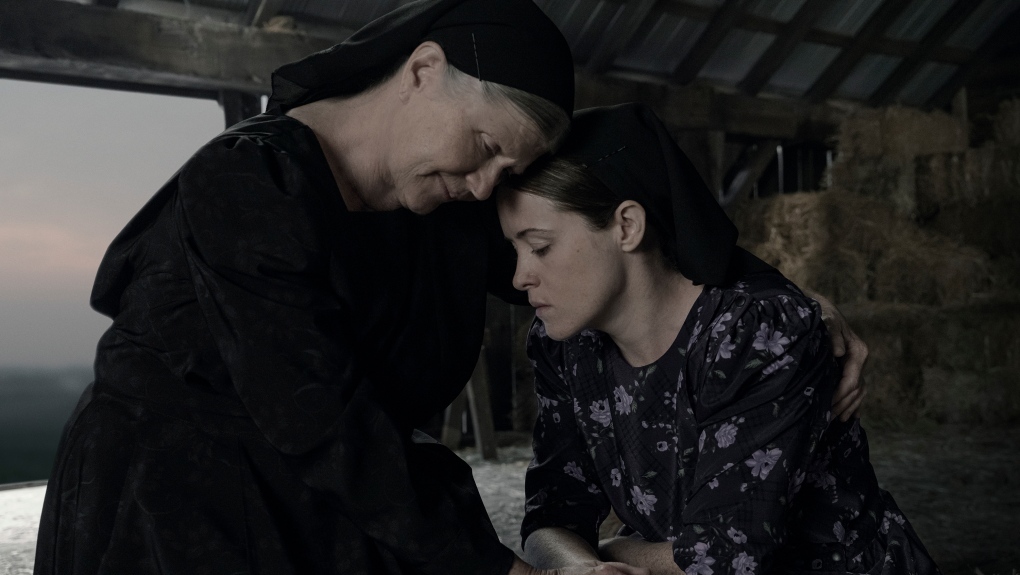 This image released by United Artists shows Judith Ivey, left, and Claire Foy in a scene from "Women Talking." (Michael Gibson/Orion - United Artists Releasing via AP)
This image released by United Artists shows Judith Ivey, left, and Claire Foy in a scene from "Women Talking." (Michael Gibson/Orion - United Artists Releasing via AP)
“We needed to differentiate each character by using very few details, essentially using the bodice details on these dresses. We had to tell a story with colour and scale, rather than accessories and luxury,” she explained.
Additionally, Alfred bought hundreds and hundreds of dresses from yard sales and Mennonite vendors in Manitoba and southwestern Ontario, many of which were worn by background actors in the film.
The authenticity of the costumes proved a challenge for performers, as they gathered to shoot in the sweltering summer of 2021. While the interior scenes were filmed at a mercifully air-conditioned studio in downtown Toronto, the exteriors were shot at a farm near Pickering, Ont., offering no such reprieve from the heat.
“Polyester dresses in 38-degree heat – that was a tough sell,” she joked, noting many of the actors are not Canadian and had very little familiarity with plain dress.
Still, Alfred felt it important that the costumes were authentic and that the actors embrace the practicality of the garments.
“Out of my respect for the Mennonite community and the graciousness they had showed me, it was important that these costumes be absolutely accurate,” she said.
ON THE AWARDS TRAIL
After filming had wrapped, Alfred knew they had created something special. She wasn’t surprised when the many nominations and prizes came their way, but she notes Polley was.
“I said, ‘Sarah, are you kidding? I could smell Oscar on this from the minute I read your script,’” Alfred laughed.
“It was so beautifully done, and Miriam's novel is so powerful, and the group that Sarah assembled to make this project and to experience this project with - everything about it was exceptional.”
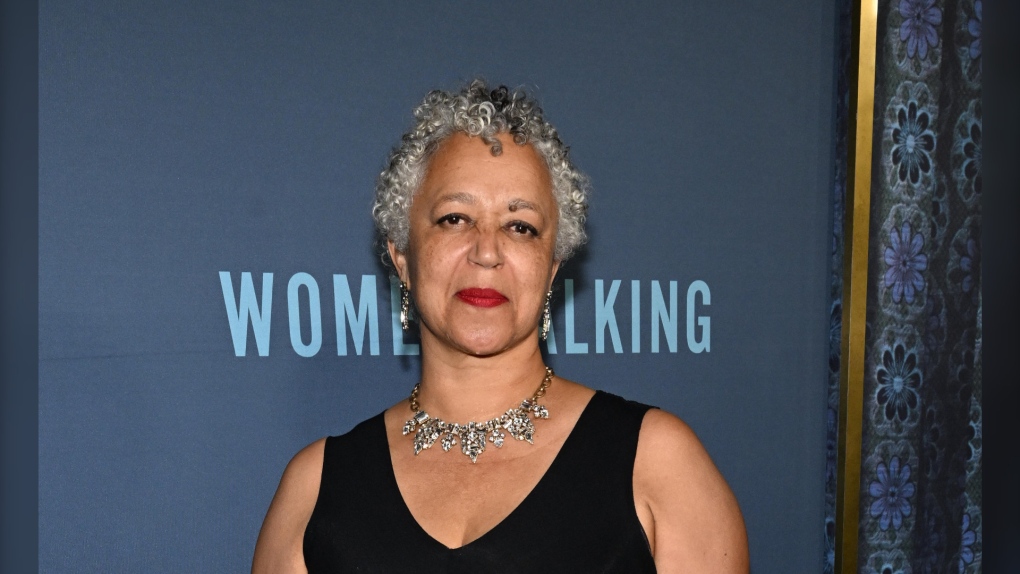 Quita Alfred walks the red carpet at the Los Angeles premiere of "Women Talking". (Source: Eric Charbonneau)
Quita Alfred walks the red carpet at the Los Angeles premiere of "Women Talking". (Source: Eric Charbonneau)
Today, Alfred is looking forward to Oscar night on March 12 and has her eye on another local project. She stayed mum on the details, for now, but said she is excited about what's to come.
Through the entire awards trail, she has felt the support of her hometown, be it from her childhood best friends who rolled out a literal red carpet across their snowy front lawn to greet her or from the Manitobans who helped her form the foundation of her work on the film.
“I was so excited for the film to open here because of the help I was given here, because of the kindness of Winnipeggers and of the Mennonite community,” she said.
CTVNews.ca Top Stories

opinion Tom Mulcair: Prime Minister Justin Trudeau's train wreck of a final act
In his latest column for CTVNews.ca, former NDP leader and political analyst Tom Mulcair puts a spotlight on the 'spectacular failure' of Prime Minister Justin Trudeau's final act on the political stage.
B.C. mayor gets calls from across Canada about 'crazy' plan to recruit doctors
A British Columbia community's "out-of-the-box" plan to ease its family doctor shortage by hiring physicians as city employees is sparking interest from across Canada, says Colwood Mayor Doug Kobayashi.
'There’s no support': Domestic abuse survivor shares difficulties leaving her relationship
An Edmonton woman who tried to flee an abusive relationship ended up back where she started in part due to a lack of shelter space.
opinion King Charles' Christmas: Who's in and who's out this year?
Christmas 2024 is set to be a Christmas like no other for the Royal Family, says royal commentator Afua Hagan. King Charles III has initiated the most important and significant transformation of royal Christmas celebrations in decades.
Baseball Hall of Famer Rickey Henderson dead at 65, reports say
Rickey Henderson, a Baseball Hall of Famer and Major League Baseball’s all-time stolen bases leader, is dead at 65, according to multiple reports.
Arizona third-grader saves choking friend
An Arizona third-grader is being recognized by his local fire department after saving a friend from choking.
Germans mourn the 5 killed and 200 injured in the apparent attack on a Christmas market
Germans on Saturday mourned the victims of an apparent attack in which authorities say a doctor drove into a busy outdoor Christmas market, killing five people, injuring 200 others and shaking the public’s sense of security at what would otherwise be a time of joy.
Blake Lively accuses 'It Ends With Us' director Justin Baldoni of harassment and smear campaign
Blake Lively has accused her 'It Ends With Us' director and co-star Justin Baldoni of sexual harassment on the set of the movie and a subsequent effort to “destroy' her reputation in a legal complaint.
Oysters distributed in B.C., Alberta, Ontario recalled for norovirus contamination
The Canadian Food Inspection Agency has issued a recall due to possible norovirus contamination of certain oysters distributed in British Columbia, Alberta and Ontario.


































